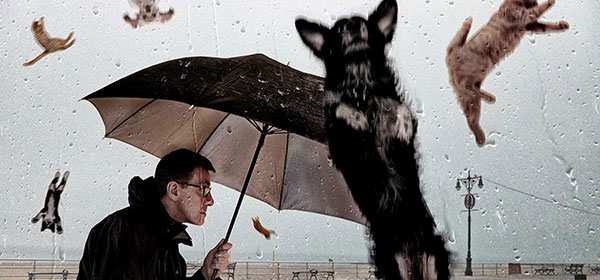When considering the etymology of the phrase ‘it’s raining cats and dogs’, it’s fun to imagine that it might derive from a phenomenal event way back where cats and dogs literally fell from the sky. Unfortunately, that never happened.
Etymologists haven’t been able to discover exactly from where ‘raining cats and dogs’ came, but there are several theories.
Theory #1: In Norse mythology, Odin, the god of the sky and storms (as well as war and death) was often envisaged with an entourage of dogs and wolves as attendants. These animals were also symbols of wind. In popular European folklore, it was common to see witches depicted riding on broomsticks through storms with cats as companions. Later, cats become signs of heavy rain for sailors.
Theory #2: The Greek expression cata doxa (which means ‘contrary to experience or belief’) sounds a lot like ‘cats and dogs’, doesn’t it? This theory holds that since ‘raining cats and dogs’ refers to rain that is unusually heavy, the idiom cold have been derived from cata doxa.
Theory #3: In old English the word catadupe meant ‘cataract’ or ‘waterfall’. Variations of this word can be found in many other old languages too. In Latin, for example, we find the word catadupa, taken from the Greek, κατ?δουποι, which referred to the cataracts of the Nile River. So it stands, when you use the phrase ‘it’s raining cats and dogs’ you might be saying ‘it’s raining waterfalls’.
The phrase has also appeared in classic English literature repeatedly over the past 400 years, including in the 1651 collection of poems Olor Iscanus by Henry Vaughan; Richard Brome’s 1652 comedy play, City Witt; and in Jonathan Swift’s 1738 satire, Complete Collection of Genteel and Ingenious Conversation.
However, it was probably Swift’s 1710 poem City Shower, which described a great flood in London that left dozens of dead animals in the streets, that truly popularised the phrase.
Which theory do you think is the most likely?
Related articles:
Why do we say ‘apple of my eye’?
What does ‘scapegoat’ really mean?
The origins of ‘steal your thunder’

